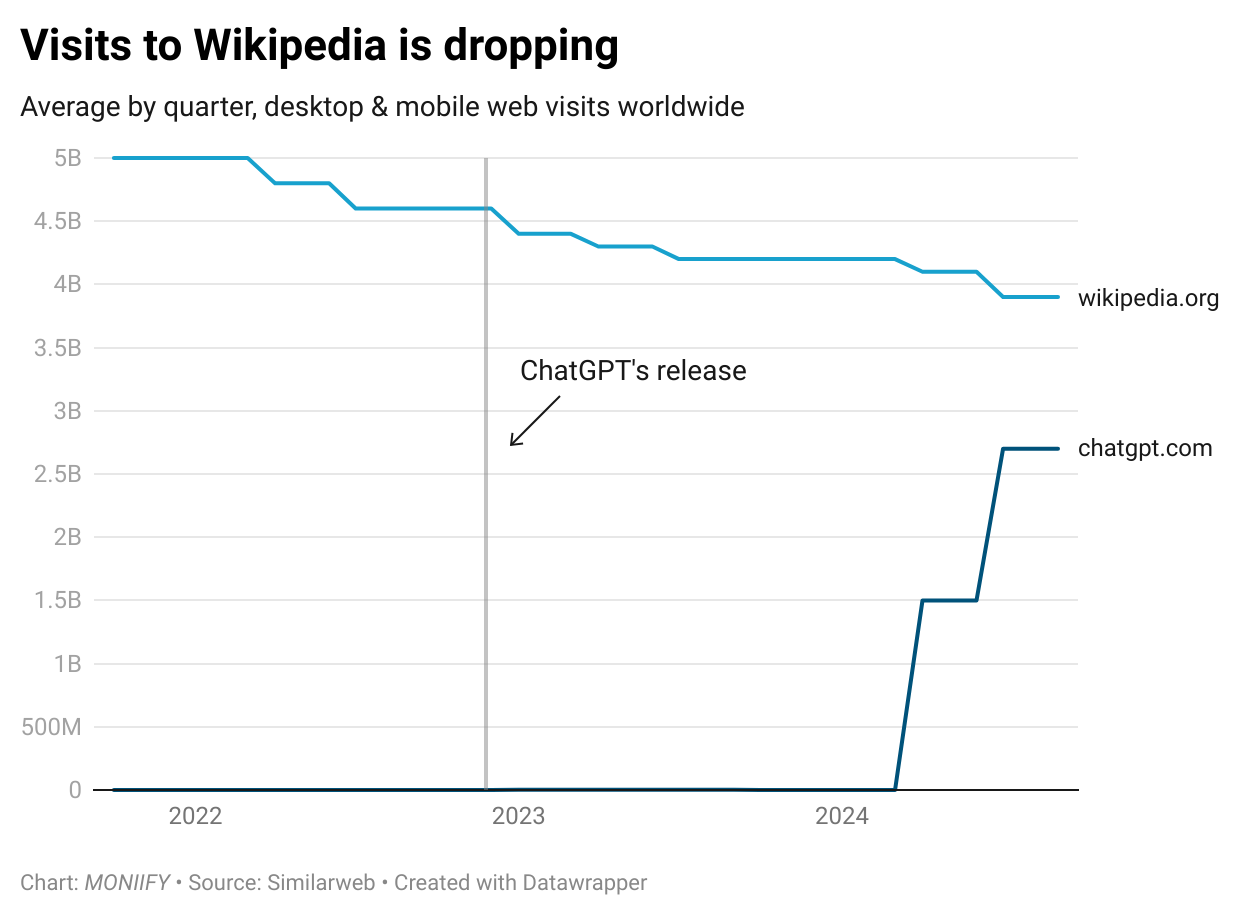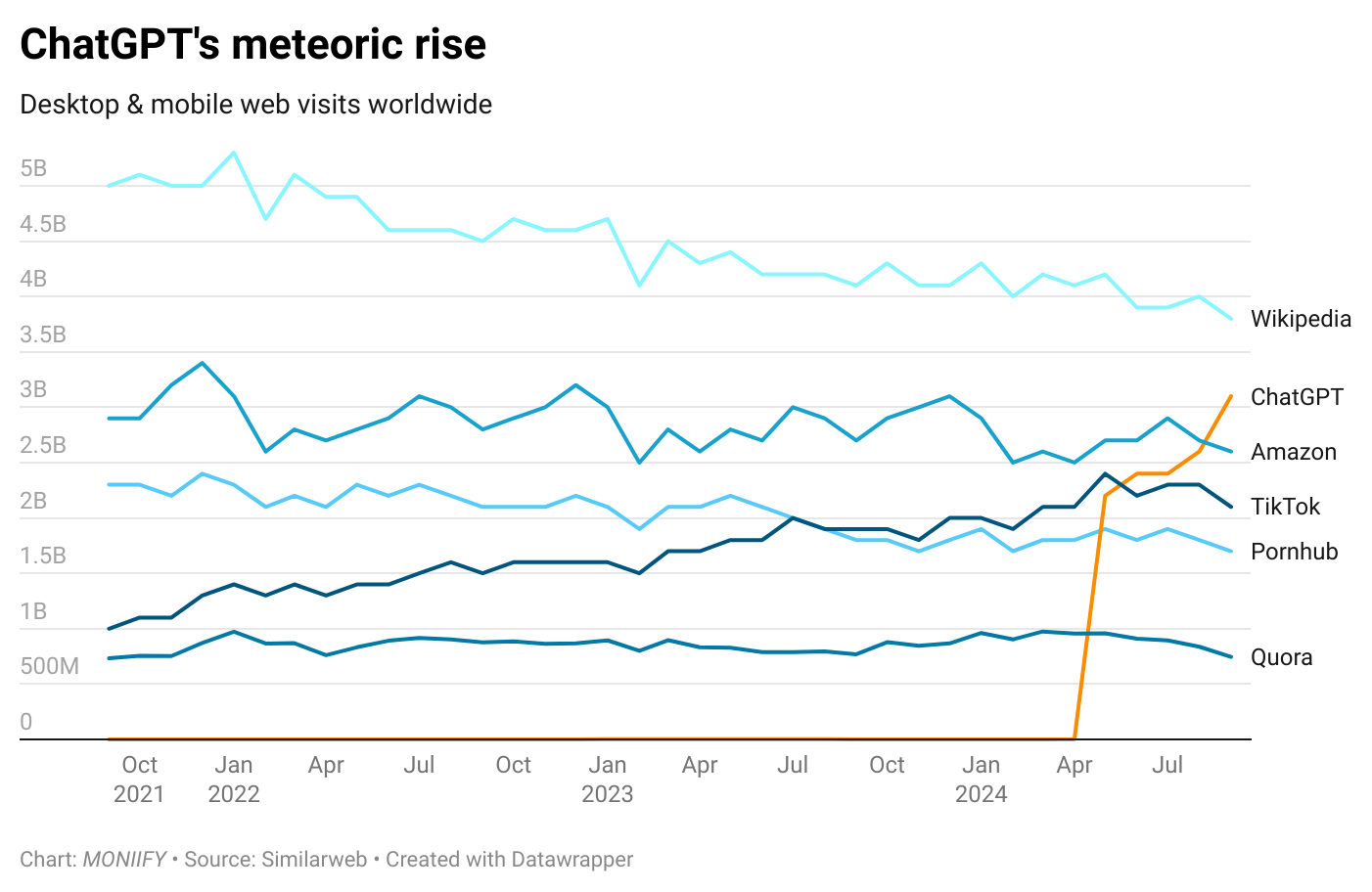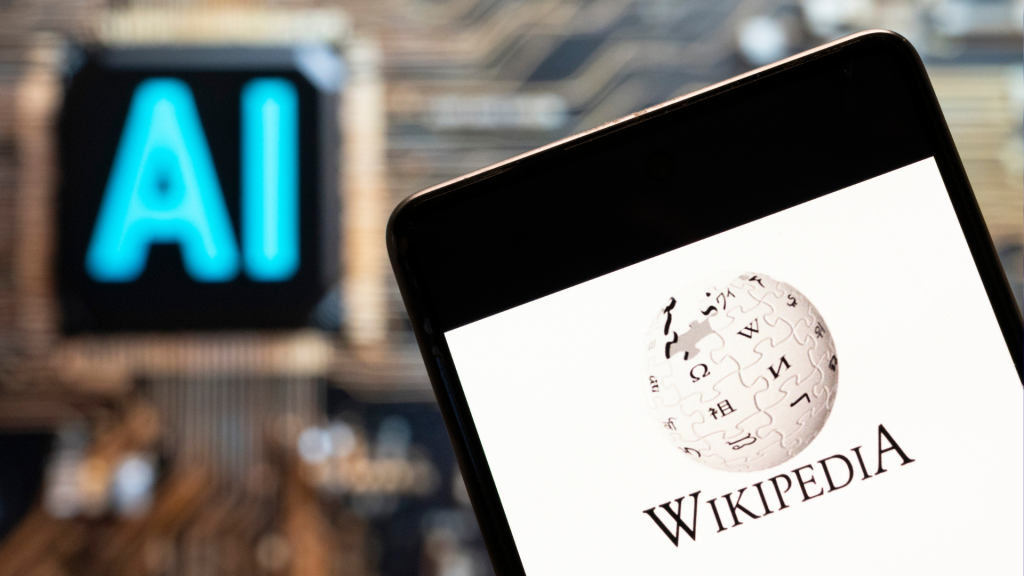Why scroll through Wikipedia when you’ve got AI chatbots that can instantly spit out an answer to every question under the sun?
That’s the dilemma for the internet’s favorite encyclopedia, which has seen the visitors to its website drop more than 15% since ChatGPT burst onto the scene in November 2022, according to data from web traffic tracking firm Similarweb.
Users are increasingly searching for the kind of personalized answers to their questions that can be delivered by AI chatbots, says Canaccord Genuity analyst Kingsley Crane.
“The promise of AI is also the peril for the likes of Wikipedia,” says Crane, who tracks several large software and AI businesses in the US.
In the most recent quarter from July to September, Wikipedia’s average monthly traffic dropped 4.9% from 4.1 billion to 3.9 billion, while ChatGPT grew 80% from 1.5 billion to 2.7 billion compared to the previous quarter, according to Similarweb’s figures.

Wikimedia Foundation, the nonprofit that operates Wikipedia, denied that AI chatbots were hurting their traffic. “We have not seen a significant drop in traffic on Wikimedia websites, which can be directly attributed to the current surge in AI tools,” a spokesperson for the foundation said in a statement to MONIIFY.
The spokesperson said the site’s pageviews – which is a different metric from the visits compiled by Similarweb – stood at about 15 billion per month and had consistently been between 15-18 billion per month since October 2020, including occasional rises and dips.
Wikimedia noted in its 23/24 annual plan that there was a decline in traffic happening even before the advent of AI chatbots. For example, between 2019 and 2021, monthly unique visitors in the US fell by 7%.
It’s Q&A sites, search engines too
But it’s not just Wikipedia that’s taken a hit, according to data from Similarweb.
Q&A site Quora recorded a nearly identical dip in the same period, despite having released its own AI chatbot, Poe, last year.
Quora appears to have ditched plans for an IPO a few years ago, heading to the private markets to raise a war chest in what should be a bumpy ride ahead. It raised $75 million from Andreessen Horowitz (a16z) at the start of the year.
Even the OG of search is feeling the heat since AI chatbots came on the scene. Google has seen its web traffic fall by 2.1% since September 2022.
As for ChatGPT? In September alone, it racked up a whopping 3.1 billion web visits on desktop and mobile – more than big names like Amazon, TikTok and Pornhub 😏, according to Similarweb. And while ChatGPT’s not going to overtake the frontrunners any time soon – Google had 82 billion visits the same month – its traffic is growing at a startling pace, up more than 74,000% from a year ago.

Make it personal
Those figures reflect changing consumer preferences in the AI era, in which people are coming to expect tech to provide rapid, personalized responses to their specific requests.
And nailing that personal touch presents a MASSIVE opportunity for businesses across all sectors, according to Boston Consulting Group. It expects a $2 trillion shift in revenue over the next five years to companies that can master personalization and “fine tune every customer interaction.”
In retail, for example, Amazon and Walmart are already using AI to recommend products and spur sales. Both companies are trading 53% and 78% higher for the year to date.
But most aren’t getting it right. The majority of companies are doing personalization only superficially, leading to frustrated customers and wasted opportunities, says Mark Abraham, a senior partner at BCG.
If you can’t beat them… join them?
The content business has been battered by tech disruption, first in the form of social media platforms, and now AI. The news industry has been a high-profile casualty, but the contagion is now spreading to platforms like Wikipedia and Quora.
Wikimedia is all too aware of the AI threat.
“The ease of creating AI machine-generated content creates both opportunity and risk for Wikimedia’s role as a human-led, tech-enabled knowledge system, as well as for Wikimedia’s financial model,” the foundation said in its 24/25 annual plan.
While it relies on donations and grants, the foundation is also focusing on other fundraising activities such an endowment fund for long-term revenue growth and Wikimedia Enterprise, a paid service for businesses.
On its part, Wikipedia – which is edited by volunteers – has been testing AI for internal use, including evaluating content and improving citation accuracy.
“The approach on Wikipedia has always been that humans edit, improve, and audit the work done by AI,” the foundation spokesperson said.
In July last year, the foundation experimented with a new Wikipedia ChatGPT plugin, but concluded that ChatGPT isn’t the ”new information seeking paradigm” – at least, not yet.
Despite that, Wikimedia noted that the change in audience behavior – from clicking on links, to chat – is likely to stay, even as these AI chatbots rely on Wikipedia to build their large language models.
That paradox is a question that even Wikipedia doesn’t have an answer to, for now.






